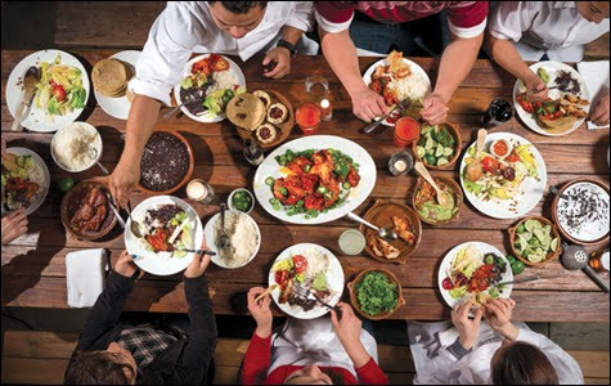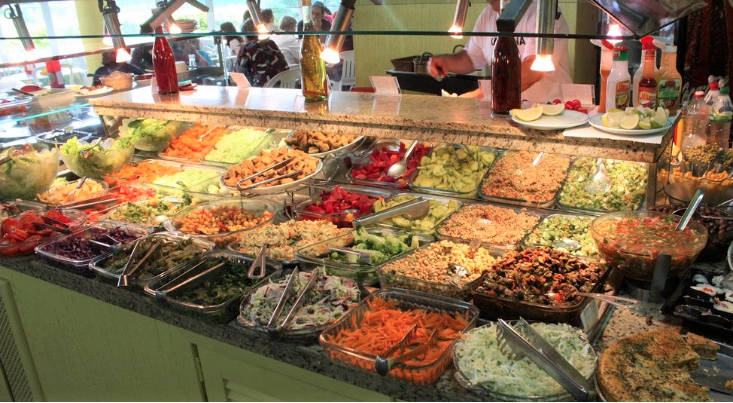
Freshly prepared meals, preferably enjoyed in company with family, friends or (as here) colleagues, are good for complete health – meaning, physical, mental, emotional and spiritual well-being. This is the positive message behind the studies constantly showing that ultra-processed food products, many of which are snacked anytime, anywhere, that displace fresh meals, evidently cause overweight and obesity, many diseases, and premature death.
This column intends to be and to stay positive. There has been a deluge of news in the world’s media these last weeks on how consuming substantial amounts of ultra-processed food products makes you fat, ill, or dead, and that the more of these foods you consume, the worse it is for you. Two such studies published in BMJ (formerly the British Medical Journal) from groups in France (1) and Spain (2) with an accompanying editorial (3), are summarised here below. The implication, the other side, of all this gloom and doom, is thrilling. This is that enjoying freshly prepared meals, when possible in company (see the picture above) keeps you fit, vibrant and alive. No, I am not suggesting that the good happy long life is all about freshly prepared meals, but they help, and it surely stands to reason that people who enjoy acquiring, preparing, cooking, serving and consuming meals, especially as a family and/or with friends and colleagues, look after themselves in other ways also.
So why are studies on food, nutrition and health almost always mainly negative? This is a big question. One simple answer is numbers (4). Quantitative studies depend on facts and information, such as carefully collected data about diet and about disease subjected to statistical analyses. Don’t get me wrong please, such investigations are vital. The NOVA food classification originally devised by Carlos Monteiro and his team (of whom I am one), now being used by researchers in many countries, is a revelation. Their findings on the ill-effects of ultra-processed food products must surely be impressing and influencing policy-makers who are responsible for shaping food systems and supplies.
Imaginative interpretation of quantitative studies are what is needed, especially when this results in positive conclusions more likely to inspire enthusiastic action than more news about debility, disorders and death, important though these are. Also needed are qualitative studies assessing aspects of good health and well-being that by their nature are beyond numbers, such as love of art, good ideas, and joy in life. Meanwhile, I recommend the movement towards assessing the state of nations not by Gross National Product, but by degree of well-being (5) as is now being done in New Zealand (6).
“It’s ultra-processing that’s the problem”
You must have read about the new French (1) and Spanish (2) studies on ultra-processing, disease and death by now. What you may not know is the impact these, following on the recent US randomised controlled trial on ultra-processing and body weight and fat (7) (8) have had on international media coverage and thus surely on professional judgements and public opinion. Here is a small sample of short extracts from the USA.
US nationally networked CBS news, with around 9 million viewers, reported (9):
“Two large studies… are the latest to point the finger at ‘ultra-processed’ foods. They include… chips, sweets and fast food [and] also the breads, processed meats, jarred sauces and frozen meals that many people consider staples.
“In one study, researchers followed more than 100,000 French adults for about five years. They found that the more ultra-processed foods people ate, the higher their odds of a first-time heart condition or stroke: Those who ate the most processed foods were 23% more likely to suffer cardiovascular trouble compared to those with the lowest intakes. Andrew Freeman, a cardiologist not involved in the study, observed: ‘I like to say: The longer the shelf life, the shorter your life’.
“In the second study – of nearly 20,000 Spanish adults – ultra-processed foods were linked to a shorter life span. Those with the highest intake were 62% more likely to die over two decades, compared to those with the lowest intake. Mark Lawrence of Deakin University in Australia, wrote an editorial published with the studies (3). He said ‘It’s ultra-processing that’s the problem’.”

Here are some of the pictures of ultra-processed foods used to introduce media stories about their ill-effects reporting on the new French and Spanish studies. They are all of ‘naked’ products: the branded packaging is not shown. Above left is from the BBC News website, worldwide from the UK. Above right is Consumer Reports, from the USA. Below left is the US trade website Food Navigator, also worldwide. Below right is the National Post, Canada.
The national newspaper USA Today, whose circulation is 1.8 million, reported (10):
“Ultra-processed foods – think chips, cookies or your average fast-food meal – have been again and again tied to adverse health outcomes. ‘It’s a really worrisome trend’ Dr. Erin Michos, the associate director of preventive cardiology at Johns Hopkins University, told USA Today. ‘As food has become more industrialized and globalized, diets have transitioned from where everyone has to sit down as a family and eat freshly-made food, into food that’s highly palatable, easy to eat and easy to prepare.’ Michos was not involved in the study… ‘Try to avoid eating anything that has a long shelf life,’ Michos added. ‘If it’s been sitting on a shelf for a long time, it’s not really good for you’.”
Consumer Reports, the US guide, whose circulation is around 4 million, in a long report detailing examples of the four NOVA food groups, reported (11):
“Recent research has linked diets that include a lot of foods considered ‘ultra-processed’ – such as soft drinks, instant soups, and chicken nuggets – to an increased risk of obesity, high blood pressure, irritable bowel syndrome, and even cancer. Now, two new studies published in the British Medical Journal find a link between high consumption of these foods and risk of both cardiovascular disease and early death.
“Researchers don’t know exactly why ultra-processed foods may cause health problems. ‘They are often high in saturated fat, calories, sugar and salt and low in key nutrients like fiber’, says Mathilde Touvier, nutritional epidemiologist with the Sorbonne Paris Cité Center of Research in Epidemiology and Statistics Research and co-author of the French study. ‘But we also think it’s due to the wide range of chemicals and additives found in these foods, ranging from acrylamide, a cancer-causing chemical created when heating processed foods, to the bisphenol A found in a product’s packaging’.”
Food Navigator, the industry website with an undisclosed world readership likely to be of many millions, in a long article, reported (12):
“These findings add to growing evidence of an association between ultra-processed food and adverse health outcomes that has important implications for dietary advice and for food policies. The dietary advice is relatively straightforward: eat less ultra-processed food and more unprocessed or minimally processed food. Policy makers should shift their priorities away from food reformulation, which risks positioning ultra-processed food as a solution to dietary problems, towards a greater emphasis on promoting the availability, affordability and accessibility of unprocessed or minimally processed food”.
Enjoying freshly prepared meals in company
It is often said that diets based on “fast” or “convenience” ultra-processed food products are cheaper than diets based on freshly prepared meals, and take less time in modern busy lives.
The time-saving claim is part of the propaganda of food product manufacturers and caterers. Obviously it is true that it is quicker to snack on ultra-processed food than to prepare meals.
But what’s the hurry? The average daily time spent watching television in those countries that consume most ultra-processed food is around five hours.
It is also obviously true that diets containing a lot of fresh fruit, meat and fish are likely to cost more than those that instead include lots of products like French fries, burgers and nuggets. But it depends on what you buy. In Brazil, basic staples such as rice and beans, cassava and cabbage, and also fruits in season, are relatively cheap. Also, a proper costing needs to allow for the time and money spent on drugs and surgery to treat ailments caused by ultra-processed diets. Freshly prepared meals are health insurance.
In Brazil we also have the wonderful institution of the per kilo restaurant (13). These are everywhere, in small towns as well as big cities. Usually run by families, they typically serve selections of salads, and main dishes made in the style of the region, plus desserts. You pay by the weight of the food you select. In Brazil, there are more per kilo restaurants than there are burger, French fries and cola chain outlets.

This is a per kilo restaurant, so-called because you select your salads, main dish and dessert buffet-style and pay by the weight of the food, so cost depends on what and how much you choose. A Brazilian invention, there are per quilo restaurants in every town and city in Brazil – more than there are burger, French fries and cola drinks outlets, and many are cheaper. They are perfect for office workers at lunchtimes and for families at weekends
References
- Srour B, Fezeu L,Kesse-Guyot E,Allès B, Méjean C,Andrianasolo R, et al. Ultra-processed food intake and risk of cardiovascular disease: prospective cohort study (NutriNet-Santé). BMJ 2019; 365: l1451 http://dx.doi.org/
- Rico-Campà A, Martínez-González M, Alvarez-Alvarez I, de Deus Mendonça R, de la Fuente-Arrillaga C, Gómez-Donoso C, et al. Association between consumption of ultra-processed foods and all cause mortality: SUN prospective cohort study. BMJ 2019; 365: l1949 http://dx.doi.org/10.1136/bmj.l1949
- Lawrence M, Baker P. Ultra-processed food and adverse health outcomes. Fresh evidence links popular processed foods with a range of health risks. BMJ 2019; 365: l2289 doi: 10.1136/bmj.l2289
- Cannon G. Measuring a rose with a ruler. World Nutrition 2010, 1, 6. https://www.researchgate.net/profile/ Geoffrey_Cannon/ publication/316464397_My_anti-heroes_William_Thomson_and_James_ Clerk_Maxwell_ Describing_a_rose_with_a_ruler_ and_other_stories/links/58ffc0500f7e9bcf65454a1c/
- Wellbeing Economy Alliance. Our Vision for a Movement to Bring About Economic System Change. Bold, Vital, and Entirely Possible. file:///C:/Users/master/Desktop/WEAll-brochure_INEdits_Final2.0.pdf
- Graham-McLay C. New Zealand’s next liberal milestone: a budget guided by ‘well-being’. New York Times, 22 May 2019. https://www.nytimes.com/2019/05/22/world/asia/new-zealand-wellbeing-budget.html
- Hall K, Ayuketah A, Brychta R, Cai H, Cassimatis T, Chen K, et al. Ultra-processed diets cause excess calorie intake and weight gain: an inpatient randomised controlled trial of ad libitum food intake. Cell Metabolism 2019, 30, 1-10. doi: 10.1016/j.cmet. 2019.05.008
- Cannon G. Randomised controlled trial on ultra-processed food: “These are landmark findings that processing of foods makes a huge difference in how much a person eats”. NUPENS website. https://www.fsp.usp.br/nupens/en/home-en/
- Norton A. ‘Ultra-processed” foods linked to heart disease, early death. CBS News, 30 May 2019. https://www.cbsnews.com/news/ultra-processed-foods-linked-to-heart-disease-early-death/
- Bote J. Eating junk food is easy, but lots of it may lead to early death, heart disease, studies say. USA Today, 30 May 2019. https://www.usatoday.com/story/news/ health/2019/ 05/30/junk-ultra-processed-food-increases-risk-early-death-heart-disease/1284082001/
- Levine H. The mounting evidence against ultra-processed foods. New studies suggest that they increase the risk of heart disease and early death. Consumer Reports, 29 May 2019. https://www.consumerreports.org/packaged-processed-foods/the-mounting-evidence-against-ultra-processed-foods/
- Morrison O.Fresh evidence of links between ultra-processed food and health risks revealed. Food Navigator, 31 May 2019. https://www.foodnavigator.com/Article/2019/05/31/Fresh-evidence-of-links-between-ultra-processed-food-and-health-risks-revealed
- Cannon G. Weighing it up. The per quilo restaurant. World Nutr, 2012, 3, 11. https://www.researchgate.net/publication/316109193_My_hero_Rudolf_Virchow_Creator_of_ social_medicine_and_other_stories
Tags: NOVA. Ultra-processing.